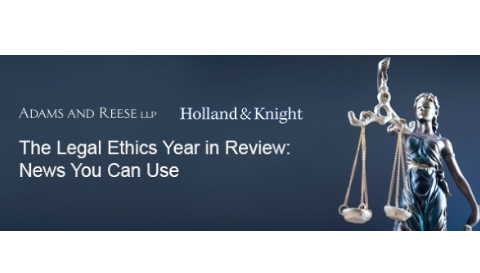DQ News — Law Firm Disqualified (Imputed Lateral Conflict), Judge Accused of Close Conflict
Posted on
“Tucker Ellis Disqualified From Insurance Fight With Seaman Corp” —
- “Seaman Corp. got Tucker Ellis LLP disqualified as Zurich American Insurance Co.’s counsel due to a conflict of interest in a suit alleging it failed to fully defend it in a product liability case.”
- “Seaman sued Zurich and Everest National Insurance Co. after the insurers allegedly failed to provide a complete defense of the litigation, brought by Target Corp. Seaman moved to disqualify Tucker Ellis as Zurich’s counsel here, arguing that Lindsey Sacher—formerly employed by Calfee, Halter & Griswold LLP—represented Seaman in the same matter involving Target.”
- “Sacher has a former client conflict under Ohio Rule of Professional Conduct 1.9, according to US Magistrate Judge Amanda M. Knapp of the US District Court for the Northern District of Ohio. Knapp agreed with Seaman that Sacher had substantial responsibility for representing Seaman in the insurance coverage matter when she was with Calfee.”
- “Knapp also held that Sacher’s role in the underlying matter was substantial enough to impute the conflict to Tucker Ellis under the rules in Ohio.”
“Florida Supreme Court Justice Faces Second Motion to Disqualify This Week” —
- “Whitney Boan, an Orlando-based attorney, on Wednesday filed a new motion to disqualify Florida Supreme Court Justice Jamie Grosshans from presiding over litigation in which her husband is a member of the entity whose conduct is at issue.”
- “The cases underlying those motions are based on a dispute about whether several nominees meet residency requirements to fill vacancies on a new Sixth District Court of Appeal and a revamped Fifth District Court of Appeal.”
- “In the case against the Fifth District Court of Appeal Judicial Nominating Commission as a defendant, Boan claimed that Grosshans violated Canon 3E(1)(d)(i) of the Florida Code of Judicial Conduct because her spouse, Joshua D. Grosshans, is a member of the Sixth District Court of Appeal Judicial Nominating Commission.”
- “Boan added that even if an appellate judge determines that a motion for disqualification is not legally sufficient, a jurist could still voluntarily recuse if he or she believed that ‘such recusal would be in the best interests of the administration of justice.'”









